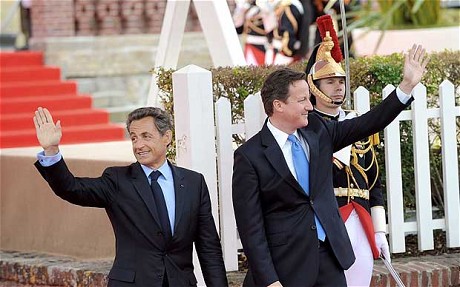
From Shashank Joshi, the Telegraph: Nato’s job in Libya is all but done. As the conquering heroes met in Paris yesterday, there was no “Mission Accomplished” banner in sight. In place of triumphalism, we’ve substituted lessons galore – about how durable Nato remains, and its discovery of a new model of apparently riskless war.
But have those who gathered in the halls of Old Europe missed a darker lesson lurking beneath their victory? It is surely a warning sign that every major rising power, every aspirant to a permanent seat on the United Nations Security Council except docile Japan, opposed the exhortations of London and Paris to go to war. That applies not just to the two Asian giants, India and China, but even to Germany, the economic linchpin of Europe, and a diplomatically energised Turkey, whose influence in the Middle East is at its highest since the days of the Ottoman Empire. . . .
When Nato went to war over Kosovo in 1999, the world was a different place. Russia was an economic basket-case led by a drunk. India, which faced international isolation for testing nuclear weapons, was growing at half the rate of 2010. China was neither the world’s second largest economy nor Washington’s biggest creditor. Today, all that has changed. True, it would still be foolish to underestimate the global reach and technological edge of Western military might – or, more particularly, American military might. But flexing those muscles will not be as simple as before.
When asked about a no-fly zone back in March, Turkey’s prime minister lambasted the West’s use of Libyans as “pawns in oil wars”. Vladimir Putin hit out at the “medieval calls for crusades”. Brazil lamented the illegitimacy of a war championed by “an old world order”. China’s state-controlled press declared that “the air attacks are an announcement that the West still wants to dominate the world. . . .”
The growing web of constraints on the West can be seen in Nato’s reluctance to step in to stop the carnage in Syria (although there are, admittedly, plenty of other reasons for inaction). Neither India nor China will stop buying oil and gas from Damascus, as the US demanded last month – why should they sever their economic lifelines for the slender hope that Syria will turn into a democracy? Turkey, which has considerable sway over its neighbour, will hedge its bets to the end rather than prematurely burn any bridges. Syria sits at the very heart of the Arab world, and most regional powers would sooner see President Assad level every one of his cities than welcome a major Nato operation in the Levant.
In Paris, David Cameron and Nicolas Sarkozy will find themselves feted by the Libyans. They may even find time for a few self-congratulatory moments. But growing powers have growing vetoes. Further down the road, it is these states that will write the rules of the game and set its tacit expectations. Advocates of full-throated humanitarian intervention should not be surprised if Libya is one of its last hurrahs.
Shashank Joshi is an associate fellow at the Royal United Services Institute. (photo: Jewel Samad/AFP/Getty)
Image: afp%209%203%2011%20cameron-sarkozy.jpg
